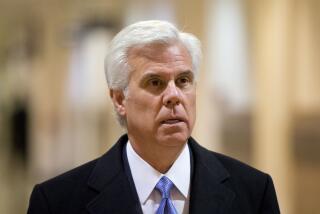Company Is Accused of Illegally Exporting Military Gear to Iran
- Share via
A company owned by a key figure in the Iran-Contra affair was charged Thursday with illegally exporting military equipment to Iran and other countries.
Forway Industries, a New Jersey military-parts manufacturing company, its president and two executives, were charged with illegally exporting aircraft radar systems to Iran in indictments returned by a federal grand jury in San Diego.
Meanwhile, the company and its former president, Jacobo Farber, pleaded guilty in federal court in New Jersey to charges of illegally shipping military parts to Japan and England from 1983 to 1985. The parts apparently were meant for use in other countries, prosecutors said.
Forway’s chief stockholder, Willard I. Zucker, a Swiss-based financial adviser who is cooperating with the special prosecutor in the Iran-Contra affair, was not named in either case. Zucker, an American citizen, managed the accounting and diversion of money for Marine Lt. Col. Oliver North’s covert operation, in which funds from the sale of arms to Iran were funneled to the Nicaraguan Contras.
Assistant U.S. Atty. Phillip L. Halpern, who is handling the San Diego case, said Thursday that the U.S. Customs Service investigation that led to the indictment is continuing. He would not comment on Zucker’s role.
Latest Indictment in Probe
The San Diego indictment is the latest stemming from a complex undercover Customs Service investigation into the illegal exportation of defense articles to Iran.
Forway, its president, Ronald C. Wade, and two of its managers, Tushar K. Basu and Gregory A. Rogers, are charged with conspiring to export sophisticated radar navigational equipment manufactured by San Diego-based Teledyne Ryan Electronics.
Halpern said the San Diego indictments show that illegal activity continued at Forway even after Farber left the company in late 1986, about the same time the Iran-Contra affair became public.
Wade, who replaced Farber, obtained a fraudulent “end-use certificate” to conceal the fact that the company knew navigational components were being shipped to Iran, Halpern said.
Forway attempted to mislead Teledyne Ryan, the Customs Service and the State Department by indicating that the navigational systems were to be exported to Beechcraft West Germany for use by the West German Border Patrol, according to the indictment.
The federal charges in New Jersey show that prosecutors believe Forway illegally exported military equipment as early as 1983--well before Iranian-born businessman Albert I. Hakim and retired Maj. Gen. Richard V. Secord contacted the firm for help in selling U.S. weapons to Iran.
May Have Continued Practice
The San Diego charges suggest that the company may have continued the practice even after exposure of the Iran-Contra affair in late 1986.
Zucker managed the North operation through another of his companies, Compagnie de Services Fiduciares, a Swiss financial management firm that handled banking and accounting for the secret operations of North, Secord and Hakim.
CSF received more than $31 million from Iran for the secret arms sales in 1985 and 1986. About $12 million of that went to the CIA to pay for the missiles and missile parts that the White House sold to Iran in hopes of winning the release of American hostages in Lebanon. Of the remaining $19 million, at least $3.2 million was used to finance a secret arms airlift to the Contras.
Hakim and Secord attempted to buy a one-third interest in Forway in 1986, but the deal fell through when the Iran-Contra affair became public.
Congressional investigators said they suspected Secord and Hakim of trying to use Forway as a vehicle for more arms sales to Iran beyond the official sales approved by President Reagan, but they were unable to prove that allegation.
The indictment indirectly supports that contention, since it alleges that Forway was already engaged in illegal arms sales to Iran when Secord and Hakim first approached the company.
Times staff writer Doyle McManus contributed to this report from Washington.
More to Read
Inside the business of entertainment
The Wide Shot brings you news, analysis and insights on everything from streaming wars to production — and what it all means for the future.
You may occasionally receive promotional content from the Los Angeles Times.










